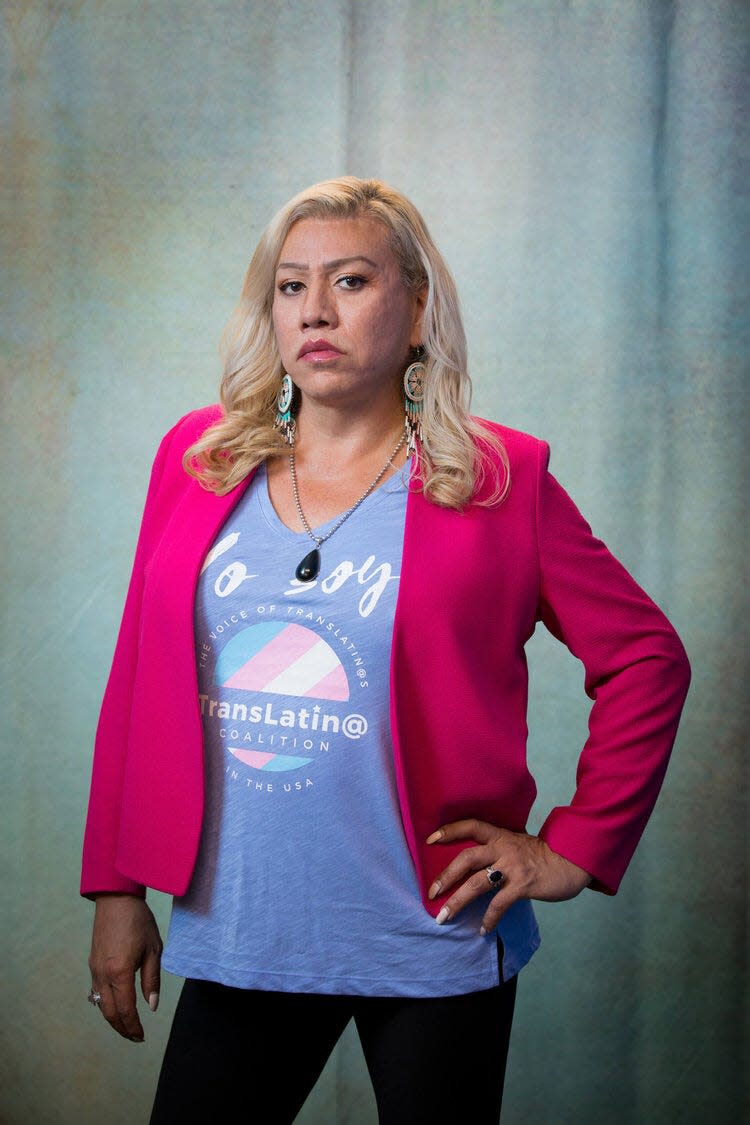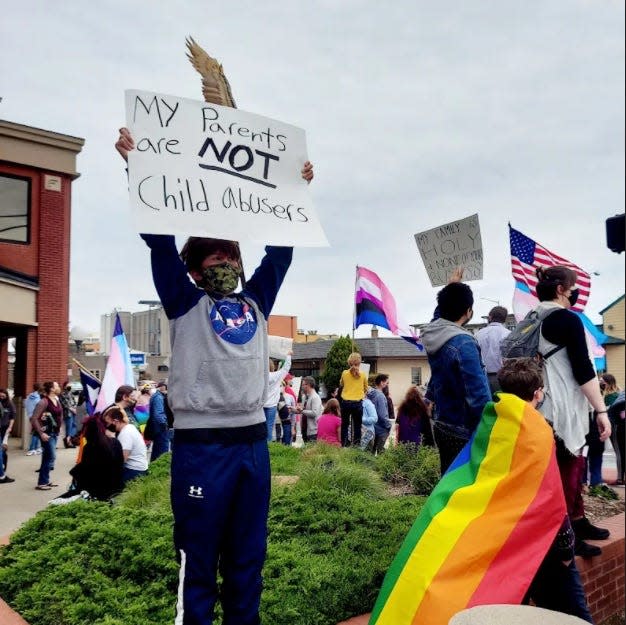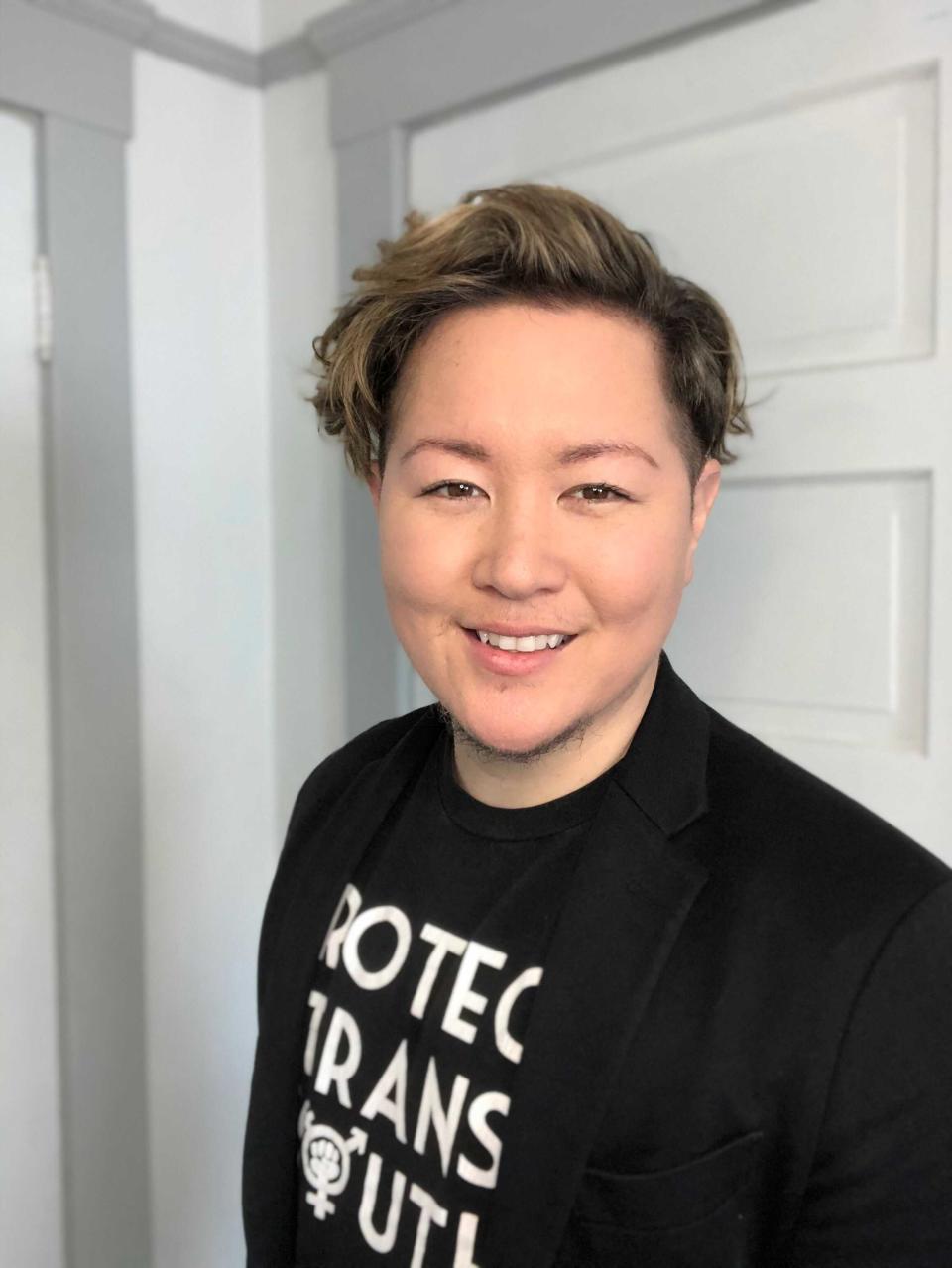'We're going to fight': Trans people express outrage over anti-LGBTQ measures in Texas, Florida
Florida legislation that would restrict discussion of gender identity and sexual orientation in schools reminds 21-year-old Sage Dolan-Sandrino of a transgender bathroom policy that caused her misery when she transitioned as a teen.
"I was only allowed to use the nurse's bathroom," which was located far from her classroom, said Dolan-Sandrino, an Afro-Cuban queer and trans person who lives in New York. "Since it took so long to get to and from the bathroom, teachers stopped letting me go. It was impossible for me to focus in class and, in combination with the bullying, I stopped engaging in class and became distant and depressed."
Dolan-Sandrino worries that today's trans youth will feel similar pain from a rising wave of state bills that seek to restrict trans people in such areas as classroom discussion, bathroom use and sports participation, including legislation advanced in Florida this week dubbed the "Don't Say Gay" bill by critics and a temporarily halted Texas gubernatorial order calling for investigation of parents who get gender-affirming care for their children.

"When legislation like this makes its way into our schools, we are allowing the next generation to be taught to harm, silence and erase queer youth. I am scared for the state's queer youth and I am scared for my own family in Florida," said Sandrino, who serves as the Monica Roberts Fellow at the National Black Justice Coalition, which is dedicated to empowering the Black LGBTQ community. "I'm outraged and fearful."
Trans people who spoke about the surge in anti-LGBTQ legislation with USA TODAY said their emotions run the gamut – from sadness, stress and fear to anger, combativeness and resilience.
For Bamby Salcedo, president and CEO of The TransLatin@ Coalition, the governmental proposals are disturbing even if they're not surprising for a community "that has been under attack for more than 500 years."
"Personally, it enrages me that there are people like the governor of Texas, and there are many others, who continue to push for the criminalization of our existence," she said.
The political climate that results in such policies is a gut punch to morale, but sadness can't erode the resolve of those fighting for trans rights, said Salcedo.

"Those of us who are at the front lines, we're going to stand up to this and we're going to fight and we're going to push to ensure that these types of situations are not going to happen," she said.
Opponents of Texas Gov. Greg Abbott's order scored a victory Friday when a state court temporarily stopped child abuse investigations of some parents of transgender children, ruling that Abbott exceeded his authority. Abbott instructed the Texas Department of Family and Protective Services to begin the investigations in February, citing Attorney General Ken Paxton's legal opinion "that a number of so-called 'sex change' procedures constitute child abuse under existing Texas law."
Order blocked: Judge blocks Texas Gov. Greg Abbott's order to treat gender-affirming trans care as 'child abuse'
The Human Rights Campaign, which fights for LGBTQ rights, commended the decision in a tweet, as did the American Civil Liberties Union, which represented, along with Lambda Legal, the parents of a 16-year-old transgender girl who had undergone gender-affirming care.
"We will continue to fight with trans youth, their parents and their doctors until all trans people are affirmed and have access to the care they need," the ACLU tweeted.
BREAKING: A Texas court has issued a statewide ruling blocking the state of Texas from investigating families with trans youth.
We will continue to fight with trans youth, their parents and their doctors until all trans people are affirmed and have access to the care they need.— ACLU (@ACLU) March 12, 2022
Paxton tweeted that he will appeal the ruling, which he described as "Democrat judge tries to halt legal and necessary investigations into those trying to abuse our kids through 'trans' surgeries and prescription drugs...I’ll win this fight to protect our Texas children."
The Florida bill, which prohibits public school "instruction" on gender identity and sexual orientation from kindergarten to third grade, was passed by both houses of the legislature but still needs the signature of Gov. Ron DeSantis, who signaled support last month. He said it was "entirely inappropriate" for teachers to be talking to students about gender identity and said parents "must have a seat at the table when it comes to what's going on in their schools."
The effects of such governmental actions on emotional well-being are pervasive, according to a poll of LGBTQ youth released in January by The Trevor Project, the largest suicide prevention and crisis services organization for young LGBTQ people. In the poll, 85% of transgender and nonbinary youth said recent debates over anti-trans bills have negatively affected their mental health.
Efforts to ban doctors from prescribing puberty blockers or hormone therapy, the kind of gender-affirming treatment targeted by Abbott's order, resulted in strong responses: 73% of transgender and nonbinary youth said it made them feel angry, 57% sad, 47% stressed and 40% scared. More than one-third felt hopeless, helpless or nervous.

Those responses speak to the sadness and pain felt in the trans and LGBTQ communities, but there's also the inspiration felt watching LGBTQ youth in Florida who are engaging in walkouts and protests to fight the proposed legislation, said Sam Ames, Trevor Project director of advocacy and government affairs.
"These incredible young, trans, non-binary, LGBTQ people … are missing school in order to show up to statehouses, show up at a hearing, speak for themselves and speak for their friends," said Ames, who testified against investigations of trans youth and their families before the Texas Department of Family and Protective Services Friday. "They are seen as politically powerless (but) continue to show up anyway and remind these lawmakers that control is not the same as power and that these youth are stronger than anything that is coming at them."
Proposed legislation threatens to erode the support systems desperately needed by trans people, who face high rates of homelessness and suicide attempts, said Diamond Stylz, executive director of Black Transwomen Inc., a non-profit based near Dallas.

Although the consequences can be more traumatic for a young person starting to transition than for a 40-year-old like her who has built a strong support system, the effort to fight legislation can take its toll, said Stylz, who also recognizes the political and societal gains made over the years by trans people.
"Just having to go to Austin here in Texas to fight these kinds of legislation all the time, among all the other things I do in the organization … that affects our mental health," Stylz said. And for trans students, even those with supportive families, legislation and other government policies have "given license to bullies in their schools to ramp up … that kind of hate and rhetoric. It takes all of our mental health down."
Trans people are moving away from Florida, Texas and other places "because it's become really dangerous to live as trans in other parts of the country," said Cristina Herrera, founder and CEO of Translatinx Network, a non-profit based in New York that provides support for trans people, especially immigrants.
But worry about repressive legislation extends to New York and other places considered more amenable to trans rights, she said.
"There has been progress in some parts of the country, but with that bill in Florida and what has been happening in Texas, it once again puts us in an environment where we're terrified. It's nerve-racking because bills, laws and policies can (spread) like a cancer in other parts of the country," Herrera said.

a.t. furuya, senior youth programs manager for GLSEN, a New York-based organization that works to ensure that LGBTQ students can learn in a safe environment, empathizes with trans youth who are dismayed by the situation facing friends they have made via social media in faraway places, including Texas and Florida.
"They're seeing what their friends are going through, what the families are going through and it's impacting their mental health as well," said furuya, who is based in San Diego and is queer, trans and non-binary. "It's really heartbreaking for me to understand why adults would feel it's OK to do these things. It really is a level of bullying and harassment towards LGBTQ+ youths that we haven't seen in the past."
Elliot Tebbe, a University of Wisconsin assistant professor with a Ph.D. in counseling psychology and a trans man, said he and other trans people feel "a sense of exhaustion (from feeling) constantly under attack by different legislators and all these different policy initiatives."
However, he said it's important for trans people not to internalize the negative assessments that accompany such legislation.
"These policy initiatives can be really isolating. Finding ways for trans people, who I think very much feel targeted, to find other trans folks to connect with, talking about how it's affecting you can be really helpful towards disrupting that internalization," he said. "Advocacy … can be beneficial. At the same time, it can be exhausting. Pay attention to what you have capacity for in terms of advocacy. This is where cisgender allies need to be able to step up to the plate and help with that activism."

The "unprecedented number of bills that are trying to chisel away rights and opportunities" – more than 100, including an Alabama proposal that would make providing gender-affirming care a felony – represent a backlash to progress made by trans people, said Ellen Kahn, who oversees programs designed to help LGBTQ youth and families for the Human Rights Campaign.
"As trans people have been more visible, from TV shows like 'Pose' and trans actors winning awards to elected officials like (Delaware state Senator) Sarah McBride, and accepted, folks who see that as a threat to them, this is what they're reacting to," Kahn said. "I think they're losing and going after kids may be one of their last gasps for air."
This article originally appeared on USA TODAY: Texas, Florida LGBT restrictions stire anger, resolve for trans people

